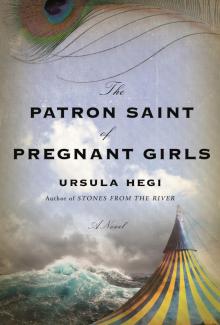- Home
- Ursula Hegi
The Patron Saint of Pregnant Girls Page 12
The Patron Saint of Pregnant Girls Read online
Page 12
“Snowballs,” I prompt.
“Because the boys threw snowballs at the dogs.”
“Your father helped the dogs get apart.”
“Was I born yet, Mutti?”
“You were still waiting to born.”
She pats my belly.
“Inside our wagon I kept us warm…”
“With me in your belly.”
No stories of storks and babies for my daughter.
I kiss the top of her head. “Then I heaped all our scarves and all our blankets on the bed.”
Of course I don’t tell her how I heated her father’s chilled body with mine, fingers roving over him, pulling the most frozen part of him into myself, and how I was overcome by an odd and ancient power that reached for me through centuries. And after all I don’t tell Heike, I take her to play in Luzia’s wagon while I rush back and lock the door so that I can lie with my hands on myself until they become his.
* * *
You braid your daughter’s hair.
Remind her to wash her hands.
Demonstrate for the hundredth time how to tie her shoes.
How to boil two eggs.
To count beyond twelve.
The again and again.
And no forward.
When she doesn’t want to hear or see you, she shakes her head and makes her hair fly till she’s dizzy, then opens her arms to steady herself.
Or fly away?
The winter she’s seven, I send her to school in Emmerich; but she runs away from school, new scratches on her knees and elbows.
“It pains me,” her teacher tells me, “to tell you that your daughter is quite … slow. That’s why other children push and tease—”
“You must not let them do that to her.”
“That’s what I try.” She nods, a small-boned woman with a friendly mouth. It’s clearly hard for her to say this: “Heike’s mind cannot—”
I must not allow her to finish. “I read to my daughter every evening.”
She folds her hands as if in prayer, tips her fingers against her jaw.
“My Heike has always been a good learner. She remembers the stories I tell her, and she tells them back to me.”
“She has some … basic knowledge.”
“Good, then.”
“But it pains me to tell you—”
Keep your pain to yourself, I want to shout.
“—that Heike’s mind cannot hold on to more advanced learning.”
There it is—what I’ve been trying to figure out for many months—why Heike is no longer making progress with numbers and the alphabet and linking letters into words.
“Heike gets in her own way if she doesn’t want to do something,” says the teacher. “She’ll put the side of her face on the desk, slide it back and forth, avoids eye contact.”
“I’ve never seen her do that,” I lie.
“Heike puts a lot of effort—”
I lean toward the teacher.
“—into not learning.”
“I promise to work harder. I’ll practice letters with her, words … and I’ll read her stories till she falls asleep and—”
“Sehr gut.” Heike’s teacher sounds pleased. Very good.
“—and someone else in our family … her grandfather will teach her more about numbers.”
“That’s exactly what we recommend for children like Heike.”
Children like Heike?
But maybe I should be encouraged. I imagine all of us helping Heike to move forward, including this teacher who smiles although her friendly mouth quivers.
“We recommend that the family teaches the child.”
“I already have some plans how we—”
“At home.”
It’s only then that I understand in my bones: my instinct to keep Heike safe can never be enough, no matter how many people teach her about words and numbers and stars, about nature and legends, and I love her fiercely—a thousand times more than I already do.
* * *
Herr Ludwig counts and writes down numbers with Heike; Luzia shows her how to weave long grasses across a forked branch; I teach her how to form the easiest letters, beginning with: o … c … v … This is better for her, we reason, than school, where she’ll learn to compare herself to other children, get hurt by words and fists.
She loves the learning, loves our attention, takes into her mind as much as a seven-year-old will. And forgets the rest. People can’t tell, not yet—she’s still like other seven-year-olds. Fast and agile. Running, skipping, somersaults. Fascinated by the trapeze. Too dangerous. The Ludwigs and I conspire to distract her. Herr Ludwig hires her to help with his act, to follow him into the arena with the Zirkus Bible, watchful about the order of Bible stories he directs. I nudge her into the orchestra conducted by Herr Ludwig, who procures a wooden box with a child-size cello. Heike whispers to her cello. Listens to it. With music there’s nothing she has to learn or remember; it already lives inside her, ready for the hum and vibration of her cello. Music threads itself through her body, through her arms and fingers and chin and thighs.
* * *
In the audiences I notice other women’s daughters dressed up for the occasion, daughters who will grow into women. Eventually, I come to pity their mothers. My daughter will always be my girl.
People click their tongues. “That one…”
Let her be! Let her be a child, then. Mine—
I teach her as much as she can take in, choose tasks we can do together. I make new costumes, and she loves the silken and diaphanous fabrics, wraps herself into the brilliant colors that contrast this barren landscape. When I mend rips and holes, she does the basting, long uneven stitches, while I do the fine hemming and seaming; and all along I praise her—I have to, praise every tiny effort, every tiny fragment of every tiny damn effort, every—
She cups my cheek.
I flinch from her hand.
“Mutti?”
I smile. Make my lips go wide. Turn them up at the ends.
“Are you angry with me, Mutti?”
“No. No no no. No—”
“You’re making your scary smile.”
Have I mentioned my delight in my daughter? She likes flying insects. Strawberries. Pretty buttons. Whenever she sees one she likes, I buy it for us—one at a time—and design costumes to go with those buttons, reinforcing seams to withstand vigorous acts. Old costumes I restore—apostles and angels—concealing worn fabric and puckered seams with trim and embroidery. I know the difference between expensive fabric and cheap, and the Ludwigs let me buy the best they can afford. I teach Heike what I’ve known since childhood watching my mother sew: even cheap fabric will look expensive if you add quality buttons.
She is the most enchanting girl I know. When she plays the cello, she is resilient, intuitive, this girl who cannot count past twelve, accomplished with the cello in a way no one can understand. As she grows, the cellos grow too. She laughs and weeps easily, says whatever she thinks.
“Music is your magic,” Herr Ludwig tells her, “your very own magic. We’re all magicians in a way, divining what lies beneath the surface of the ordinary and the extraordinary. And the amazing.”
PART FIVE
Winter 1878–1879
24
A Quicksilver Murmur
The Old Women lean from their front windows for hours. Pillows between bosoms and windowsills, they let gossip ferment. Across the space between their windows they comment on everyone who passes; click their tongues at couples who walk hand in hand in public; applaud when children play hopscotch or do cartwheels—just as prior Old Women applauded them when they were little girls—and in that become children again, living all moments of their lives at once—child, woman, Old Woman.
Now that Lotte Jansen is back in her house, the Old Women help as much as she lets them. They feel an added meaning to their days because Lotte makes them more compassionate. Measured against her misfortune, they’ve been spared the worst, an
d they take comfort in their luck, in their competence. They fret about Wilhelm.
“I saw her carry him across the dike to where the others drowned.”
“That poor little boy.”
“I’ve seen her laugh.”
“Laugh with her baby? That’s not odd.”
“She’s already thrown him into the sea once.”
“Because she turned from God and—”
“From herself. Lotte Jansen turned from herself.”
“Crazy with grief.”
“No, she’s amazingly sane.”
“Crazy.”
“Crazy just that one day.”
“I would have put stones in my pockets by now,” says the Oldest Person of Nordstrand.
“You should!” says the Second-Oldest Person.
* * *
This competition for Oldest Person honor corrupts the beauty of aging, the wisdom of aging. You can be a devoted grandmother, say, only to turn ruthless as you get closer to the title. Winning grows more significant than your families. Instead of being joyful with your grandchildren and great-grandchildren, you brood over your health: cough syrup at the hint of a scratchy throat; long hours of sleep that matter far more than the nightmares of your little ones. As the surviving Oldest Person of the year, you can no longer be trusted.
Your rivalry bonds you. Two may connive against a third, coaching one another: live, live, live; but if the third indeed dies, the feud between the finalists will be epic. Shameless. Not that you’ll trip one another on the church steps, or stir arsenic into peach marmalade, though you may contemplate that. Your weapon is compassion. With tales of woe—true and fabricated—you’ll remind one another of lost loves and lost children and lost friends, only to push one another deeper into heartache.
Tell me more.
Once crowned, of course, you have to train for the following summer solstice because you may still outlast your rivals. You feel them wheezing behind you, waiting for any misstep, any light-headedness, blood in your piss, god forbid. If you’re bedridden for a day, say, or a week, they bring you fatty meals to hasten your end, lean over you to estimate the level of your malady. You, too, have done this. With spite and with intent. Now you know what it’s like.
* * *
Lotte is afraid of forgetting her children’s faces, their smells, the texture of their hair. That’s why she has to climb deeper into her grief. Like picking a scab. Below is still the wound, but it doesn’t bleed as much. One day before Christmas she bundles Wilhelm into Martin’s pajamas and Bärbel’s coat, carries him to the edge of the sea, sits down and pulls him onto her knees. “Look at the lights.” She points to the cool glow in the sky, blues, and above a band of white that pulls the sky closer. “Lights for your birthday, Wilhelm. One year, you’re one year old today.”
His narrow back against her chest, thumb between his gums.
She rests her chin on top of his head. “The same sky your sisters and your brother are looking at. This very moment.”
Wilhelm rocks his head, tilts her chin up. Down. And up.
“Bärbel and Martin and Hannelore.” Lotte tastes their names. “You were eight months old last time you saw them, Wilhelm. Martin’s favorite is buttermilk soup. Just like your favorite. He helps me make it, crumbles bread into a bowl of buttermilk, lets it soak…” She feels them nearby. It’s happening in the telling to Wilhelm. “Our Hannelore, she likes the eggs of seagulls, likes searching for them. Knows to take just a few and leave enough to hatch. And our Bärbel—”
—you cannot cook applesauce without seeing Bärbel’s upturned face, lips already open, waiting for that first spoon too hot she says, repeating what you tell her, too hot—
“Our Bärbel is wild for anything sweet. Remember what we call her?” Lotte turns Wilhelm so he faces her. “Verfressenes Kaninchen.” Greedy rabbit. She can sniff out sweets even if we hide them. She stuffs them into her cheeks. Like this.”
Lotte puffs her cheeks.
Wilhelm pops her cheeks. Giggles. Puffs his cheeks pops his cheeks. His feet tickle sheep have feet sheep have knees. Sheep have lips and teeth. Lips snatch the fog. Teeth yank it from earth. Make earth tremble. Chomp chomp go the sheep.
She breathes in his Wilhelm-smell, mud and buttermilk. Another smell then, earth and sweat—Bärbel. She can recognize her children by smell. Cinnamon and milk for Hannelore. Schwarzbrot—black bread—for Martin. And she’s here for them—
Now—and whenever you’ll need me. A different connection than pain and guilt because I’ve lost you, a connection to you beyond any moment of longing and panic, and I’m here in the world for you with you, a certainty that is stronger than any uncertainty when I will see you again, a peace that won’t be mine every hour though I’ll recall what it feels like and how it is there for me.
The sky widens into a fan, a swirl, that exalts Lotte, lets her grasp that her children are alive—BärbelMartinHannelore and a quicksilver murmur in a haze that warps and shimmers—alive on Rungholt that emerges once every spring for a few moments. No one can predict when. But you must be ready for its prelude, the Schwarze Sonne—black sun—when the wingbeats of a million starlings block the setting sun while they dance above the marshes in a symphony of light and motion.
* * *
Every time Lotte picks at the new scab—greedily, secretly—her wound gets smaller and her children get closer. She goes back and again to the edge of the sea where it’s easier to listen for their voices. To lure them to her, she tells Wilhelm the ancient legend she has grown up with and told all her children. About the Nebelfrau—fog woman.
“The Nebelfrau simmers the Nebel on her stove … lets it rise at dawn. But at dusk, she hauls the Nebel back down from the sky. It hides the sheep, then settles around their feet until they float on the Nebel and—”
“And what then?” asks Martin. Martin who wanted solid food long before the others. Even before he had teeth, he’d suck on a crust of Schwarzbrot, black crumbs around his lips.
“The Nebelfrau lives underneath the sea. Remember, Martin?”
The click-click of Wilhelm sucking his thumb.
Hannelore scowls at Wilhelm. “What did you do with my doll?”
To make her laugh, Lotte gives the Nebelfrau green fog.
“—not green!” protests Hannelore.
Martin chases green fog, stomps on green fog.
Wilhelm slides from Lotte’s lap, crawls on green fog.
Bärbel climbs on Mutti’s lap.
BärbelMartinHannelore … their names taste of sweat, of pollen. Bärbel snuggling against you, listening, Martin half listening, sorting pebbles into rows. Hannelore waiting to correct you in case you change a detail or leave one out. Familiar and unpredictable.
* * *
If Tilli picks Wilhelm up, he’ll sling his arms around her neck, his legs around her waist; but Sister Franziska, no matter how gently, will pry him off and send Tilli to help with the big children. Still, some mornings Tilli manages to spirit him away to the old Sisters in the retirement wing where the old Sisters tend to their rabbits. And to their lovey-birds: boy finches with reddish cheeks, girl finches with a black streak running from each eye.
The Sisters adore Wilhelm and hoard bites of sweets for him: a spoonful of pudding; a half-eaten cookie. Read him poems they’ve written with the poet from Niebühl who visits them Tuesday afternoons.
“Boy finches kill weaker boy finches,” Tilli tells Wilhelm.
“Nonsense,” says Sister Konstanze. “And don’t you scare him with that.”
“I won’t.”
“Who told you?”
“My father.”
Sister Konstanze scoffs. “Your father is wrong, but we already know that.”
Tilli laughs with astonishment and covers her mouth. Disrespectful, she thinks, and it is, disrespectful and delicious. She blurts, “He took my brother away.”
Sister Konstanze’s lips twitch.
“He said I can never come home.”
<
br /> “My dear courageous child.”
* * *
Sister Hildegunde praises Tilli. “You have learned so much here that we are promoting you to—”
“Thank you,” Tilli says, pleased.
“—to work in the Big Nursery.”
Wilhelm, they’re taking Wilhelm from me.
The abyss where my own girl lives. And never another breath—
Sister Hildegunde’s heart is aching for this Girl with the square chin and apricot hair. “You’ll still get to see all the children.”
But the impulse to find Wilhelm is stronger than Tilli’s hope of changing Sister Hildegunde’s decision. Tilli runs. A dusting of snow.
and freckles on Tilli’s face on Tilli’s breast and the sky tips
“Drink, baby … my own…”
and the big freckle in Wilhelm’s mouth, dry, the freckle is dry and Wilhelm is cold
And Tilli’s body makes what her own girl needs and is now for Wilhelm and therefore her girl cannot be so far away.
“Here, drink…”
he tugs at the freckle tugs
hum-chuck-hum of bicycle
freckles on Tilli’s fingers fly up buttons
“Ssshhhh, my own.”
close buttons, hum-chuck-hum
“Ssshhhh, baby.”
Sister Franziska eases Wilhelm away from Tilli. “I wish I could help you.”
“I won’t do it again.”
“He is not your baby, Tilli.”
“I know.” Fear and shame and I’m sorry.
“I’m sorry too.” Tears in Sister’s voice. “I’ve asked too much of you.”
Tilli cannot envision being in a place where Wilhelm is not. “He opened my buttons. He knows how.”
“This is not good for you, either.”
“I won’t do it again. Please, Sister.”
Sister motions Tilli toward the convent bicycle toppled among frozen weeds. “Will you please ride the bicycle back?”

 Ursula Hegi the Burgdorf Cycle Boxed Set
Ursula Hegi the Burgdorf Cycle Boxed Set The Worst Thing I've Done
The Worst Thing I've Done Stones From the River
Stones From the River Hotel of the Saints
Hotel of the Saints The Patron Saint of Pregnant Girls
The Patron Saint of Pregnant Girls